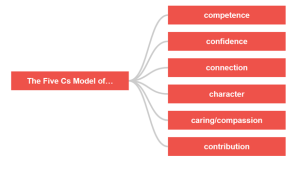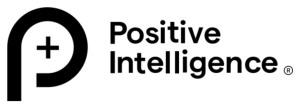FAQ
The goal of UNUH is to support youth-facing institutions and programs to facilitate the development of positive thinking, mind-set and behaviours within the target age group 15-20 (ages may vary up and down somewhat according to levels of development). Ultimately, the aim is to empower young people to realize their potential to be successful no matter their circumstances and give them a sense of responsibility and control over their minds and the outcomes in their lives. UNUH provides opportunities to learn, apply and practice some of the key skills required to achieve this goal. (see detailed program curriculum) The self-paced mobile program is designed to be accessible, affordable and convenient, relying on a limited amount of intervention from guidance counsellors, teachers, parents or facilitators.
The UNUH approach to supporting the personal development of our youth pulls from the best of four key coaching and development frameworks.
I. The Five Cs Model of Positive Youth Development
The Five Cs Model of Positive Youth Development (PYD) is a framework for PYD that outlines five psychological, behavioral, and social characteristics that indicate youth are thriving and, when high levels of the Five Cs develop, ultimately result in a Sixth C related to contributing to self, community, and society. The model focuses on the positive characteristics that enable adolescents to lead productive and healthy lives and contribute to the world in ways that benefit themselves, their families and communities, and civil society.

II. Neuro Linguistic Programming (NLP)
Neuro Linguistic Programming (NLP) initially developed by John Grinder, professor and linguist, and Richard Bandler, Psychology student, in the early 1970s, refers to a body of knowledge, models and techniques that help an individual use his/her mind for greater levels of success and positive outcomes.
III. Positive Psychology
“Positive psychology is the scientific study of what makes life most worth living” (Peterson, 2008).
Positive psychology is a scientific approach to studying human thoughts, feelings, and behavior, with a focus on strengths instead of weaknesses, building the good in life instead of repairing the bad, and taking the lives of average people up to “great” instead of focusing solely on moving those who are struggling up to “normal” (Peterson, 2008). Positive Psychology focuses on positive experiences (for example happiness, joy, love), positive states and traits (for example, gratitude compassion, resilience)
IV. Positive Intelligence© 
The breakthrough contribution of Positive Intelligence®️ research is through factor analysis to discover the core factors that impact both performance and wellbeing. While UNUH does not utilize any of the materials or specifics of Positive Intelligence©, UNUH draws on the role of mindfulness practices to help shift from the Survival Brain which tends to produce negative emotions and feelings such as anger, stress, anxiety, guilt, shame to the Thriving Brain which generates positive emotions such as empathy, compassion, curiosity and creativity.
Yes, you can pursue personal development via an app, as long as the user is committed to using the app regularly and applying what is learned to their life. Apps can provide useful resources, feedback and support, but ultimately, the individual has to take action and make changes. UNUH is designed to make the learning process as engaging and motivating as possible in order to encourage not only program completion, but application and internal change. The Token Reward system and Leaderboard are mechanisms to support the learning and practice process.
UNUH is available, after subscription, for download to schools, institutions (public, private, NGOs), Government Ministries/Agencies and Parents/Care-Givers, from the Google Playstore and Apple Store. Tech requirements are basic: internet access, a desktop or laptop computer to access the LMS (administrators/facilitators); and for students, internet access (wifi or data) and a SMART phone (android or Apple) preferably, or tablet.
You can sign up and pay for your UNUH subscription from this web-portal by clicking here: School Admin or Parents. You will need either a Credit or Debit Card or you may request information for a direct bank-to-bank payment.
UNUH subscriptions are for a 12-month period from date of purchase. The costs vary according the number of student licences being purchased through volume discount bands above 50 students. This information is available upon request. The base price is currently US$32.00 per user or JMD$5,000. Full refunds are available for up to a month after initial purchase if the client is dissatisfied with the program.
While there are no guarantees, UNUH seeks to identify sponsorship for those schools/institutions that are unable to pay the subscription fees. Applications for assistance can be made by emailing unuhclientsupport@unuh.limitlesstransformationja.com. Details such as name and location of the institution, student population, target group and number, any registrations or references, desired starting date and any amount that the applicant can pay towards the subscription, should be included.
Yes. The UNUH programme includes many of the key areas normally included in a Life Skills curriculum. These include: Building Positive Self-Esteem, Taking Responsibility, Values, Goal-Setting, Self-Care and Self-Management (including managing Moods and Negative Behaviours). You can review the full curriculum here: (add relevant link on web-portal)
At the moment UNUH is not yet an accredited program. However, UNUH provides both downloadable Digital Badges for each of the 3 Modules successfully completed and a downloadable and printable UNUH Certificate upon successful completion of the entire program, including a group Community Project. Participants must obtain at least 80% of the overall base score in order to be deemed eligible for each badge and for the end of program Certificate. The intention, over time, is to accredit the program with a suitable accreditation body.
The program is divided into 3 Modules, each with 10 units with assignments and exercises. We suggest that the UNUH curriculum be offered over a maximum of 30 weeks (2.5 semesters, or one unit per week) or, alternatively, over a period of no less than 9 weeks (approximately 2-months), with 3 weeks planned for each Module (this means that 10 units will have to be completed over each 3-week cycle. Since the program requires the completion of exercises and practical assignments in order to develop new mental habits, the best results will require time and repetition for the learning to be absorbed, practiced and become habitual.
These roles are facilitatory and provide supervision for the students and the cohorts pursuing the UNUH program. The Facilitator Role encompasses student registration within cohorts/batches; student risk-profiling (optional but recommended); review of student progress; review/approval of Brawta Challenges completed by the student and editing of program assigned tokens, as required; monitoring of discussion groups; review/approval of end of program Community teams and projects; assignment of Community project Scores. Note, with the exception of the Brawta Challenges and the Community Project, all other lessons, exercises, quizzes and assignments are self-paced and marked by the system itself.
These roles are administrative and include program subscription and payment; assigning Facilitator(s) to the program; managing any administrative issues and general program oversight.
The role of Parent on the UNUH app incorporates both the role of Administrator and Facilitator as described above.
While the UNUH team has done its best to provide culturally appropriate and engaging content, as well as a virtual reward and recognition system, it is recommended that participating institutions and parents provide some level of hands-on support. Apart from the general monitoring of student progress, this could include the following: providing in-class discussions/assignments that are related to any Life Skills curriculum being pursued and are aligned with the UNUH curriculum; participation in the cohort(s)’ Community Channel, for example, by instigating relevant discussion topics; suggesting Community Projects; and the recognition and reward of exceptional student performance by pubic recognition and/or tangible prizes, especially upon successful program completion.